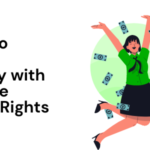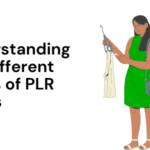Usually, when you purchase a private label rights (PLR) package, you’ll notice that it comes with a license and a list of terms. The rights and terms will determine how much flexibility you have when using the content.
The PLR license terms are usually displayed on the sales page for the product so you know exactly what you’re getting. You’ll know what you can and cannot do with the PLR.
The most common license terms that appear on many PLR sales pages are:
- You may not use my name with this PLR.
- Don’t pass along the rights to others.
These terms first appeared in one of the top PLR seller’s sales pages… and everyone else started copying her.
While the terms are brief, they’re actually all-encompassing and a fantastic summary of the usual long list of PLR terms.
The reason you’re not allowed to use the VENDOR’s name with the PLR is to prevent future hassles.
If a PLR buyer sells an eBook with the vendor’s name but doesn’t deliver the content, now the customer will start looking for the PLR vendor since their name is associated with the content – when they should actually be looking for the person who sold them the book.
This is just one example of how PLR vendors may become responsible for what their customers do. To prevent such problems, PLR buyers are not allowed to use the vendors.
The second term to note is that you’re not allowed to pass on the rights to others. What that means is you can’t sell or give away the private label rights to the content.
That is the ORIGINAL PLR CREATOR’S job. Your job is to convert the PLR content into products to sell to end-consumers.
Here’s an example… Let’s assume you buy a PLR eBook on yoga. It will come in WORD.DOC format and/or in .TXT format.
As a PLR buyer, what you need to do is give the book a new title (if you want to), convert it into a PDF (very important), set up a sales page and sell the yoga book to PEOPLE INTERESTED IN YOGA!
The yoga niche is your audience. NOT other marketers. By converting the Microsoft Word document to a PDF, it prevents the buyer from editing it. It’s a final product for personal consumption.
You are NOT supposed to be selling the PLR eBook to other marketers with private label rights. Most PLR sellers do not allow this because it’s their hard work and their business.
The only times you can sell PLR with PLR rights… is if you purchase the content with PLR Reseller rights from sites like www.plrlime.com.
Do note that there are very few sites offering PLR reseller rights. These are the exception and not the norm.
Now let’s look at other common terms which are commonly confused…
- May not claim copyright to the content
Since several other people will be buying the same PLR content as you, you cannot claim copyright to the content. They need to use it too!
There’s an exception to this rule – when you rebrand your PLR content by giving it a new cover, title, sales page, etc. you can copyright the product.
If we used the example from earlier, and you rebranded the PLR yoga book and called it Bulletproof Yoga and gave it a new cover/look, now you’ll have a unique product you can claim copyright to.
What that means is no one else can sell your product if it looks the same as yours. This is just a measure to protect your intellectual property. However, the copyright is mostly a superficial deterrent to prevent people from ripping you off.
However, you cannot claim copyright to the content inside the book if it’s still the PLR you purchased. Do you get it?
If the content inside your yoga book is the same PLR content, others who bought the PLR have the same rights as you to use it for their own marketing.
Anyway, this is a small issue. Don’t sweat it.
So, for those who are not yet aware of the rewards of using Private Label Rights, here is a list of some of the advantages:
- It is just the thing for marking your name and your business’ name.
With Private Label Rights, you can easily acquire informative products that you can use as your own. Hence, this creates the impression that you are making your own product and that you are a professional and a skilled person on the given field.
In turn, you get the trust that you need in order to compel them to buy your product.
- It triggers creativity.
One of the best things about Private Label Rights is that you can be creative in a thousand and one ways. This is because you can assemble the different elements and come up with a new and near-original work without having any difficulty of creating such product.
- Develop a product!
With Private Label Rights, you can simply modify or improve a product if ever it does not fit your taste or needs. In this way, you can both cut back wasteful time by looking for products that are totally worthless or save more money by avoiding to create a whole new product.
However, even if some people contend that it is totally unethical for a person to sell the Private Label Rights for his creations, one cannot simply surmise the fact that engaging into this kind of activity is also beneficial to the seller especially if the product is already nearing the closing stages of its “market life.”
This goes to show that people must learn how to give way to any possible changes to any product that might have already lost its income-generating potential. By allowing other people to modify or enhance the features of certain products, the advancement of such products will continue to take place. Hence, the cycle will go on.
Indeed, the basics of Private Label Rights are not just necessary for most of the Internet marketers who wish to earn more income aside from their own products but also for the whole market as well. This is because the whole system of a give and take relationship dwells in the business and that is exactly where income generates its power.
Everyone Wins with Private Label Rights
Seriously, would you believe a person if they told you that it was possible to take another person’s work, change it anyway you please and call the edited material yours?
What if that person also told you that besides being able to do so, you could actually profit from that work and not be liable for any copyright infringement?
If you haven’t heard of Private Label Rights, then most likely you’d think they were pulling your leg. But all the above is true if you are able secure these rights.
Buying the whole set of these rights are great but it can cost you. But there is a way to get almost all of these actions and not have to pay as much for master resell rights IF you acquire just the right to change or alter the material, which is exactly what Private Label Rights are.
Again, with this set of rights, you are given permission to change another person’s work. By altering the material, you have made the work your own which then allows you to profit from the material anyway you intend to.
Now time to review…
Let’s say you were able to acquire Private Label Rights for a particular E-Book. What can you do?
For starters, you can break up the book into separate chapters and then sell these as articles. On the other hand, if you were able to acquire Private Label Rights for a set of articles, you could combine them and package it as a book, which you then can sell.
You can change the material’s content by adding or removing details. You can also add pictures or illustrations as well as other media like sound or video clips.
All of these actions are possible but the best part about Private Label Rights is that you are not obligated to mention the original author (or pay them any royalties) for the changes you have done to his or her material. You can claim the material as yours by putting your name as the author of the material.
With these changes, the ways on capitalizing on them are many.
You can come up with a whole new set of products from a single material source. Take an E-Book for example. On one hand, you’ve broken up the book to sell them as articles. On the other, you’ve enhanced the book’s content with media to package it as your own work and putting it up for sale on the market.
Acquiring Private Label Rights are great for creating a brand for your business. As you may already know, one of the keys to a successful business is to distinguish yourself from the rest. With Private Label Rights, you can change the material and make it uniquely yours. If your target market likes your material, your market can perceive you as an expert in your line of business, which is something you can really capitalize on as you sell your products or services.
However, it is not only the person who acquires Private Label Rights who stands to benefit from it. It may be difficult to understand at first, but selling Private Label Rights benefits even the original creator.
With the increasing demand for original material to be sold with Private Label Rights, a writer can make good money from his or her work. The incentive is that he or she can command a higher price for the work given the rights that go with the material.
Furthermore, selling the right to change the material any way the buyer wants is actually giving new life to the material. By giving the buyer the freedom to change the content in a number of creative ways, the material’s usability sand relevance is extended.
By compensating the original content creator well; by allowing freedom and flexibility for the purchaser; and by giving the end user a wealth of very useful information, Private Label Rights are by far one of the best things out there in the world of online marketing.
Remember: Study your PLR terms and seek clarification if you’re in doubt. That’s it in a nutshell until next time.




